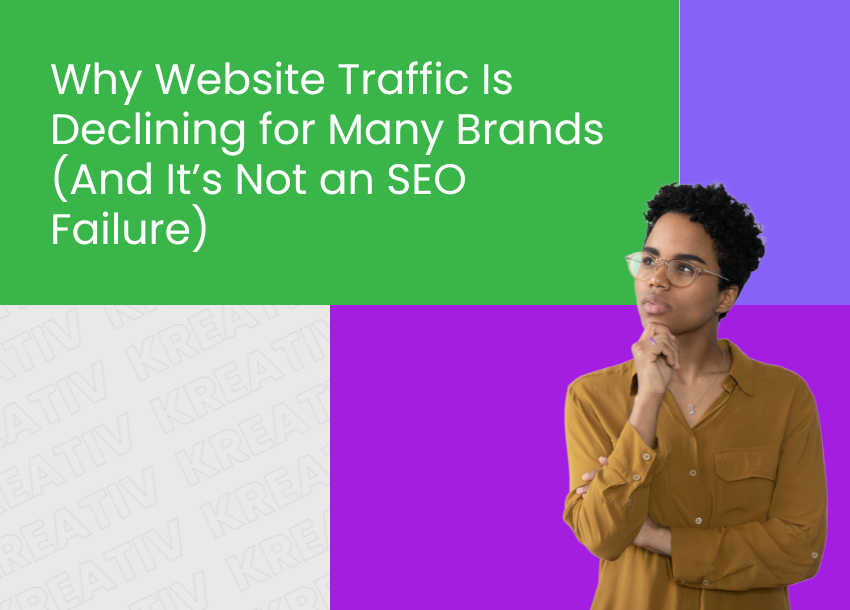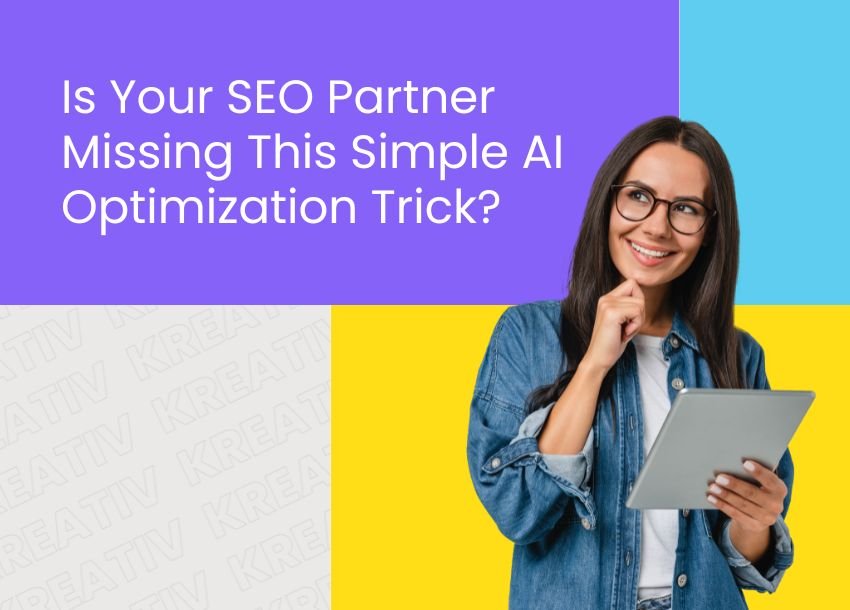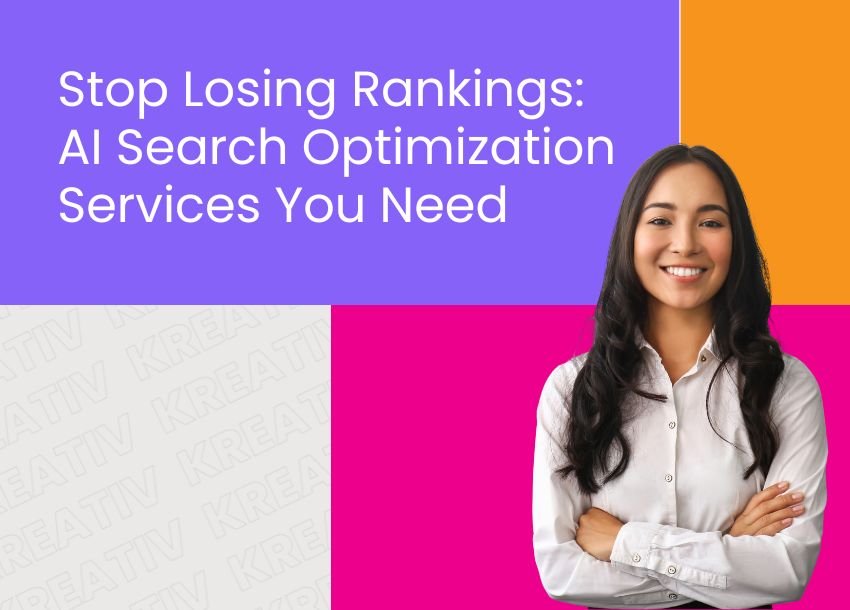AI SEO isn’t just another piece of the stack, it’s the new foundation of how humans find, trust, and interact with information.
Searching is now done beyond Google:
- On ChatGPT plugins
- In Perplexity answers
- In zero-click answers facilitated by language models
- In corporate knowledge graphs and smart assistants
Therefore, the blog posts + backlinks combination is no longer enough. You’re optimizing for AI results, not for search bots.
The real question is not “should you use AI SEO?” but “can your business thrive without it?”
What AI SEO Actually Is (And Why Companies Fail)
AI SEO is the evolution of traditional search engine optimization, built for how artificial intelligence now interprets, recommends, and surfaces information.
Unlike classical SEO that focused on pleasing bots through keywords and backlinks, AI SEO is about becoming discoverable, trustworthy, and contextually relevant to AI systems. Whether it’s Google’s SGE or LLM-based answers from ChatGPT and Perplexity, these platforms don’t rely on keywords alone. They rely on structured context, authoritative entities, and machine-readable data.
In short: You’re not optimizing for search engines anymore. You’re optimizing for the AI that powers them.
Why Companies Are Failing at AI SEO
Enterprises tend to win through repeatable processes and defined pipelines. But AI SEO is chaotic, dynamic, and situational. It requires flexible thinking, deep semantic context, and technical adaptability. Victory is increasingly reliant on four things:
1. Structured Data at Scale
AI needs schema markup, product metadata, and relationship-rich internal linking to understand your site. Without it, your pages are just raw text—and AI can’t see what matters.
2. Content as Data, Not Just Text
AI doesn’t “read” the way humans do. It parses and analyzes based on structure, patterns, and relationships. That means building modular, query-centric content—like FAQs, semantic topic hubs, and dynamic answer blocks—so your brand becomes parsable and referenceable by AI.
3. Entity-Based Strategy
AI ranks entities, not keywords. If your brand isn’t recognized as an authority on specific topics, you’ll be excluded from AI-driven answers—no matter how many times you use the right terms.
4. Performance Across Platforms
Ranking on Google is no longer enough. AI-first platforms like Perplexity, Bing Chat, OpenAI, and Gemini are now curating responses from trusted sources, and enterprises without omnichannel visibility are falling behind.
And That’s Why They Fail
Most companies are still:
- Chasing keywords without establishing topic authority
- Publishing blogs, not structured knowledge
- Optimizing for SERPs, not for how AI systems synthesize answers
- Treating SEO like a fixed checklist—not a dynamic, entity-building discipline
The result? They’re invisible on AI-driven platforms. They’re excluded from conversational search. And they’re being replaced by smaller, more agile brands that understand the new rules.
Is Your SEO Team AI-Ready
In 2025, to be successful, your agency (or internal SEO team) needs more than on-page skills. Here is a simple diagnostic:
- Do your content teams collaborate with data teams?
- Do you have schema structure on all of your key pages?
- Are you tracking brand mentions, entity authority, and AI findability, not just backlinks?
- Are you hearing about “AI-first” interfaces like ChatGPT and Perplexity, instead of Google?
- Is your customer-focused marketing, product, and customer success SEO goal-oriented strategy?
If you are saying no to any of the foregoing, you are not yet AI SEO ready. But you can be.
Not feeling like reading? Listen about this topic in Podcast.
The AI Role in Organic Growth
Shaping AI applications such as SGE, ChatGPT Browse, and Bard don’t simply reply to queries. They determine which brands are worth believing, on the basis of content organization, data reliability, and subject-matter expertise.
This implies business SEO is:
- An action plan
- A content intelligence platform
- A product education model
- A competitive differentiator
Organic growth isn’t traffic anymore. It’s about deserving to be referenced by AI interfaces. The brands that succeed become points of reference. The others get cut from the conversation.
What Companies Must Invest In (Now)
Content Engineering
Design for parsing and discoverability, rather than readability per se. Use modular designs, JSON-LD, and intentional internal linking.
Entity-Based Reputation
Brand authority emphasis through engaging with credible facts, publishing content marketing and thought leadership, and creating trusted signals on the web.
AI-Based KPIs
Go beyond “rankings” and begin to measure visibility on AI surfaces, interaction with zero-click responses, and brand visibility in summary responses.
Cross-Functional SEO Strategy
Collaborate with PR, product, CX, and dev teams. AI SEO does not happen in a vacuum, it needs org-wide visibility and coordination.
The Kreativ Street Approach: Building AI SEO-Focused Business Development
We don’t just “do” SEO here at Kreativ Street. We create search experiences ecosystems that are business-driven, human-centered, and AI-first.
We support business teams:
- Construct AI-first content repositories for multi-surface visibility
- Organize LLM parsing and chatbot identification data and metadata
- Develop scalable SEO programs on multibrand and multilingual sites
- Track AI visibility, not Google position
If you’re serious about scaling organic visibility into quality revenue, it’s time to leave keyword optimization behind, and begin to build your authority into each and every AI interaction.
How KS AI-First Execution Drove Enterprise Growth
When we say we are forerunners in AI SEO, we’re not kidding. Here are a few testimonies of our excellence:
1. Increasing Organic Sessions by 65.88% for a Global Payroll Company
The Objective
Drive consistent organic growth and qualified leads across multiple geographies for a global payroll and HR tech company.
The Approach
- Keyword strategy focused on high-intent terms such as “multi-country payroll software,” “cloud payroll systems,” and “HR automation.”
- Restructured the site’s technical SEO and architecture to improve crawlability and performance.
- Implemented FAQ schema markup to improve search visibility, featured snippet appearances, and voice search optimization.
- Executed a strategic backlink campaign, targeting high Domain Authority websites and leveraging competitor backlink gaps.
- Produced EEAT-compliant content for CFOs, HR heads, and IT decision-makers, emphasizing trust, authority, and accuracy.
- Designed and deployed a pillar-cluster content strategy to dominate semantic spaces like payroll compliance, global taxation, and HR digitization.
- Enabled guest posting across high-authority global HR and SaaS publications to boost international visibility and topical authority.
Market Share on LLMs & Organic Performance
| Metric | YoY Improvement |
| Sessions | +65.88% |
| Users | +55.88% |
| Contact Form Submits | +143.98% |
The Result
Ramco’s organic visibility improved significantly, not just on Google SERPs, but across emerging LLM interfaces like Perplexity, Bing Chat, and Gemini. The SEO efforts drove a 144% increase in high-intent form submissions, positioning Ramco as a go-to payroll authority in markets like MEA, SEA, and Australia.
2. Building Authority for a Fast-Growing Fintech Company
The Objective
Establish organic visibility and build domain authority for a newly launched fintech website, with a focus on lead generation and long-term search equity.
The Solution
- Strategically mapped target keywords—a blend of informational (e.g., “how does invoice financing work”) and commercial (e.g., “SME lending platform”) to cover the full funnel.
- Added FAQ schema markup to capture featured snippets and enhance rich result visibility on key pages.
- Executed community seeding on platforms like Quora, Reddit, and niche fintech forums to improve LLM discovery and co-citation signals.
- Listed the brand across high-trust fintech directories and aggregators, helping boost both local SEO and contextual relevance.
- Ran a strategic backlink campaign, targeting gaps in competitor backlink profiles and leveraging PR coverage from funding news.
- Built pillar content hubs on themes like digital lending, SME financing, and regulatory compliance, using semantic long-tail keywords to establish topical authority.
LLM Ranking via AI SEO Strategy
| Metric | YoY Growth |
| Organic Traffic | +75% |
| Impressions | +34% |
| Organic Leads | +35% |
Keyword Ranking Growth
| Ranking Tier | Oct ‘24 | June ‘25 | Net Gain |
| Top 10 | 2 | 8 | +6 |
| Top 20 | 6 | 17 | +11 |
| Top 30 | 0 | 22 | +22 |
The Result
The fintech brand went from invisible to influential in just 9 months. Its structured content and strategic LLM optimization efforts led to higher placements not just in Google but in AI-driven search environments. With 75% more organic traffic and a 35% uptick in leads, the foundation for long-term SEO scalability and category leadership is now firmly in place.
This is No Longer a Choice
By 2025, AI will not just transform SEO. It will substitute SEO that hasn’t evolved.
Enterprise SEO teams that refuse to adopt AI are already falling behind in search visibility to brands that aren’t even showing up in Google, because they’re showing up in answers instead.
If you’re considering whether you’re ready for AI SEO, you’re behind.
The actual question is, who is assisting you towards advancement?
Now, let’s talk about how Kreativ Street can get your business AI SEO ready, today.



